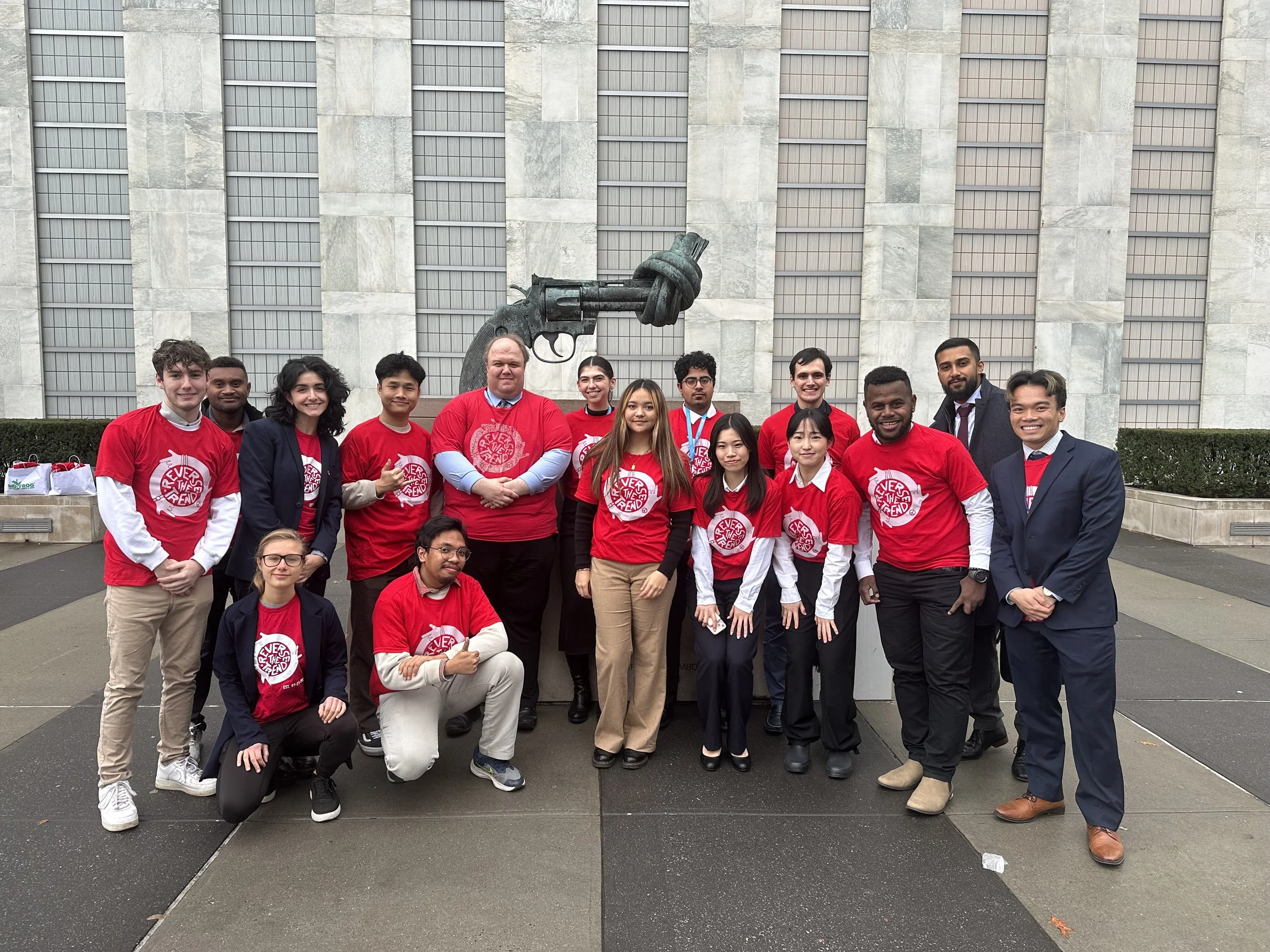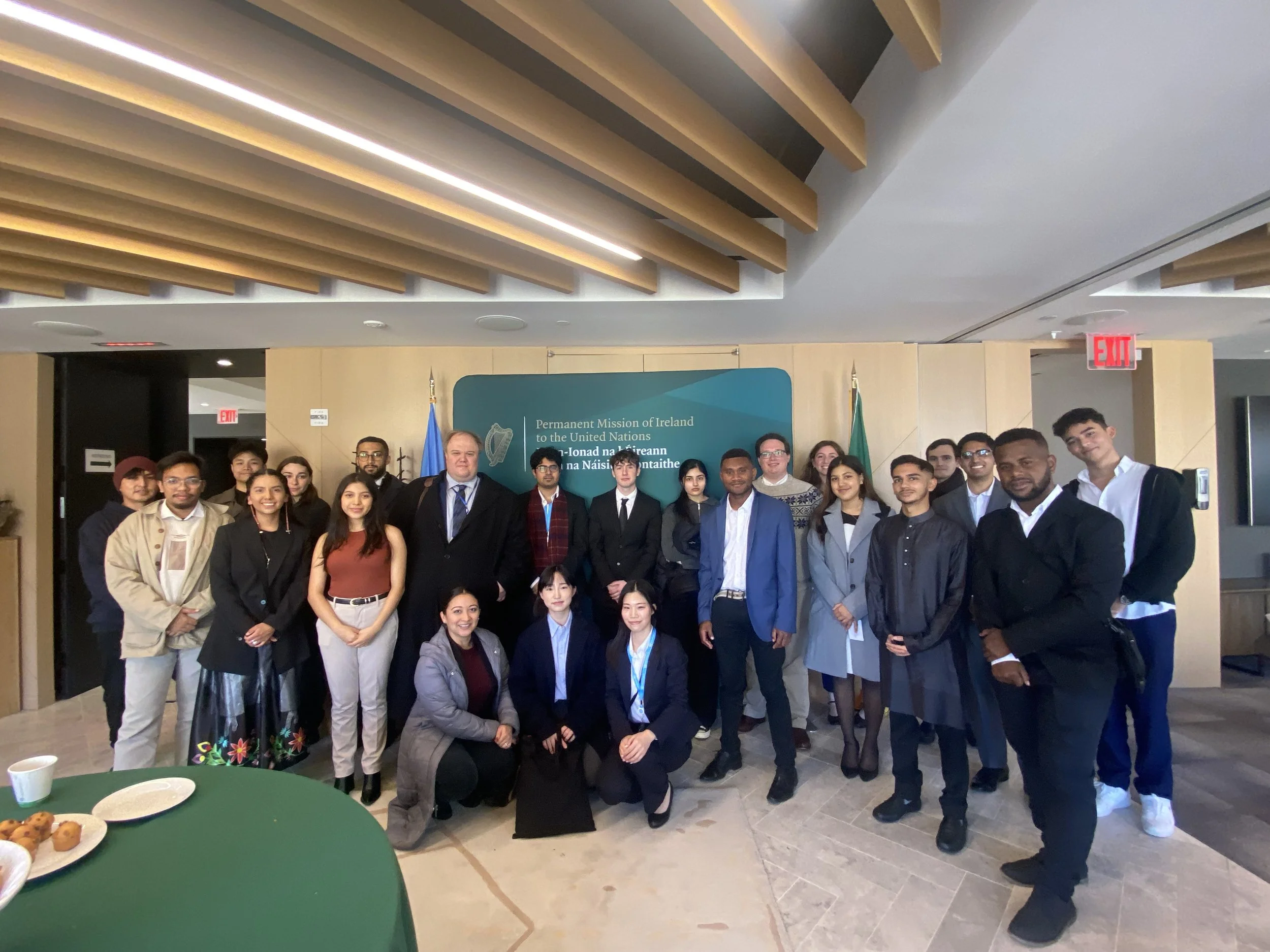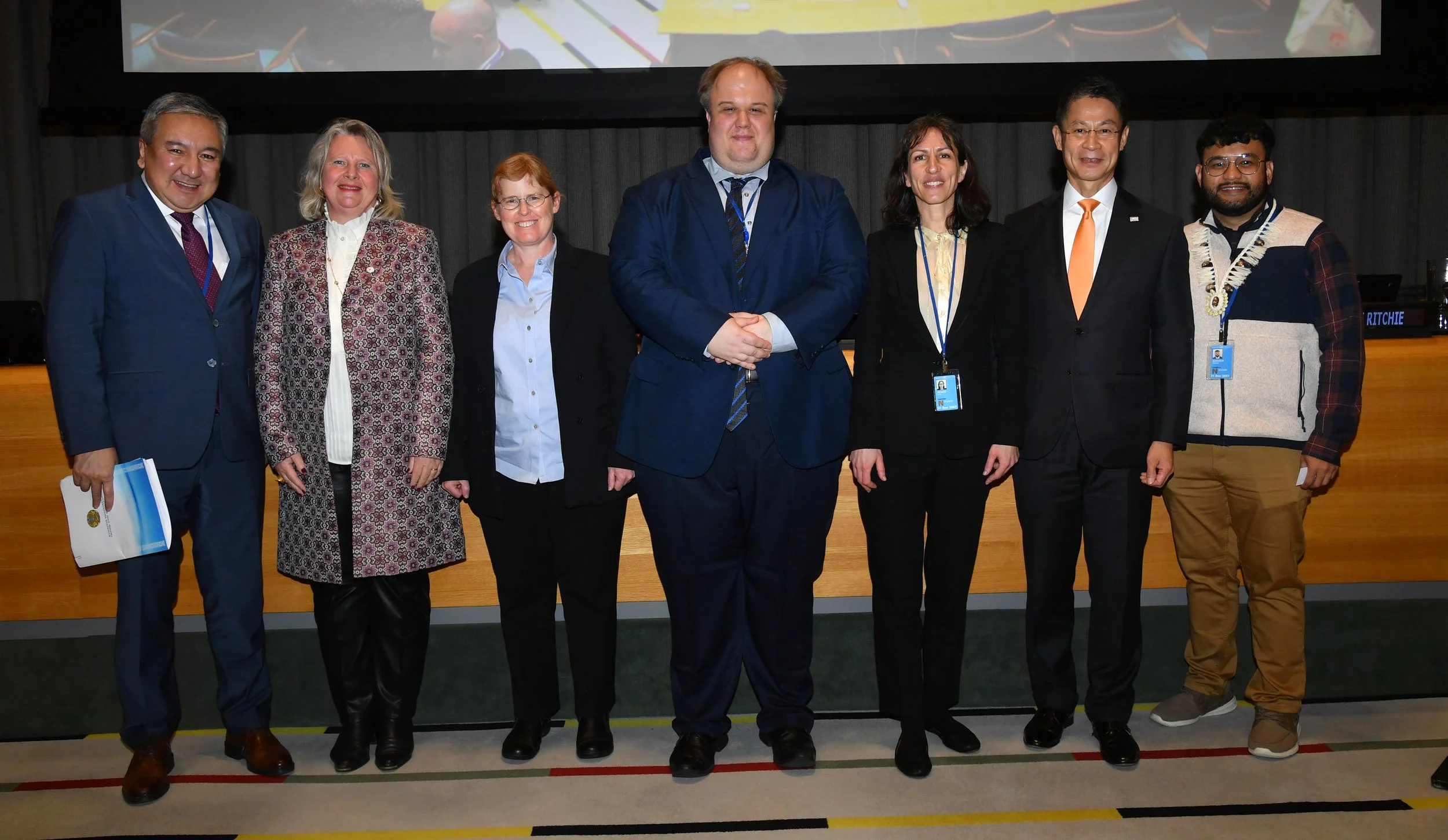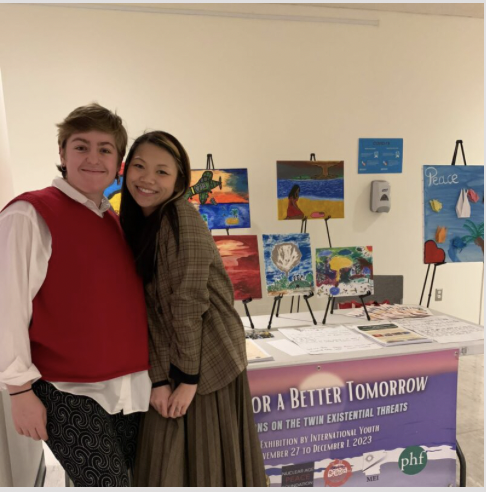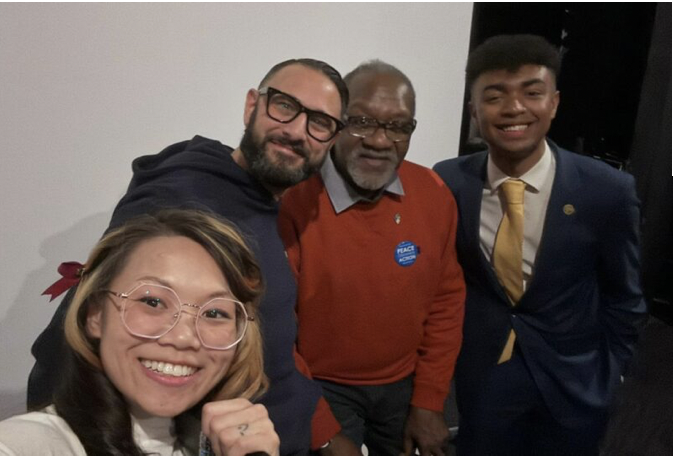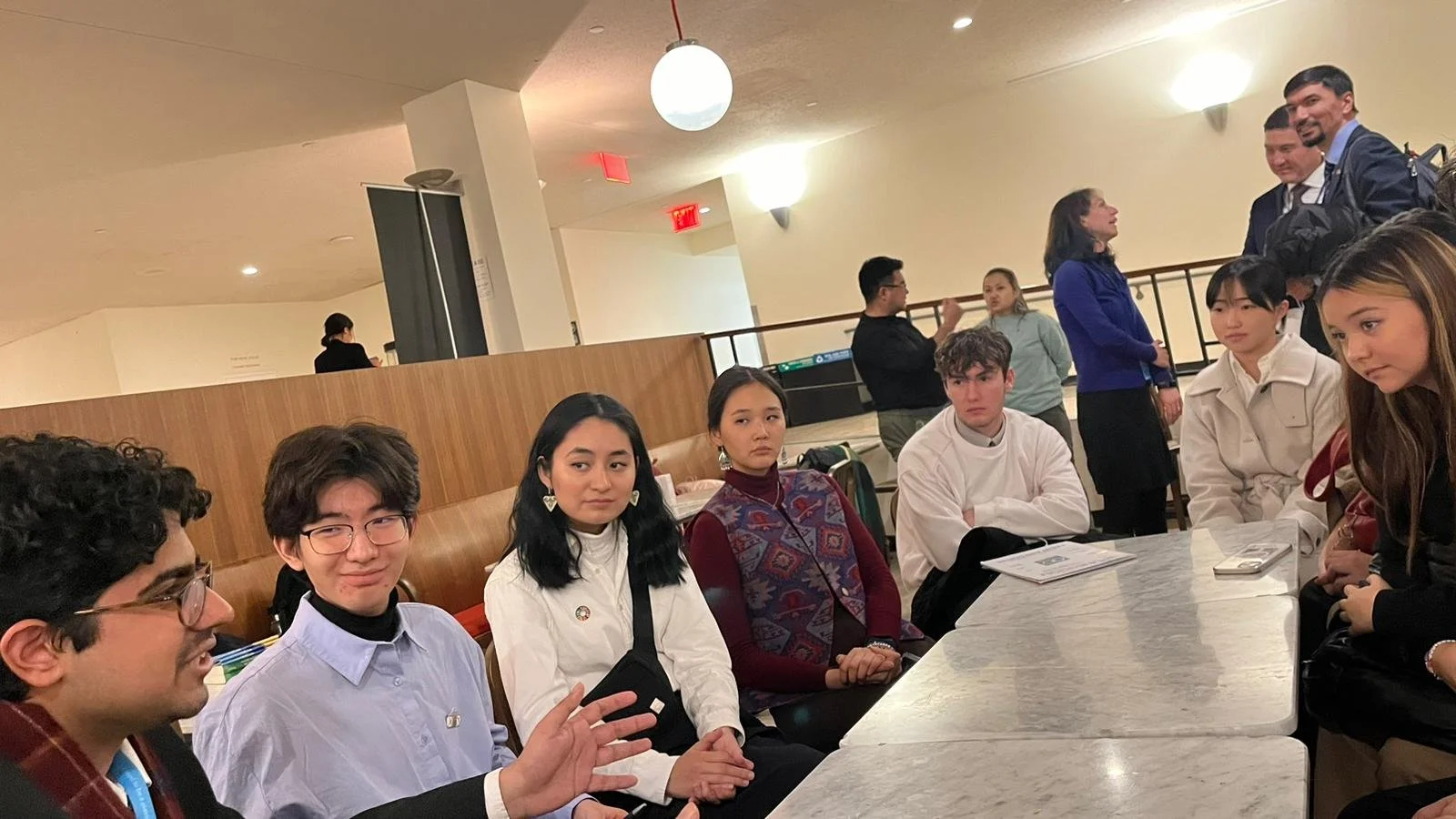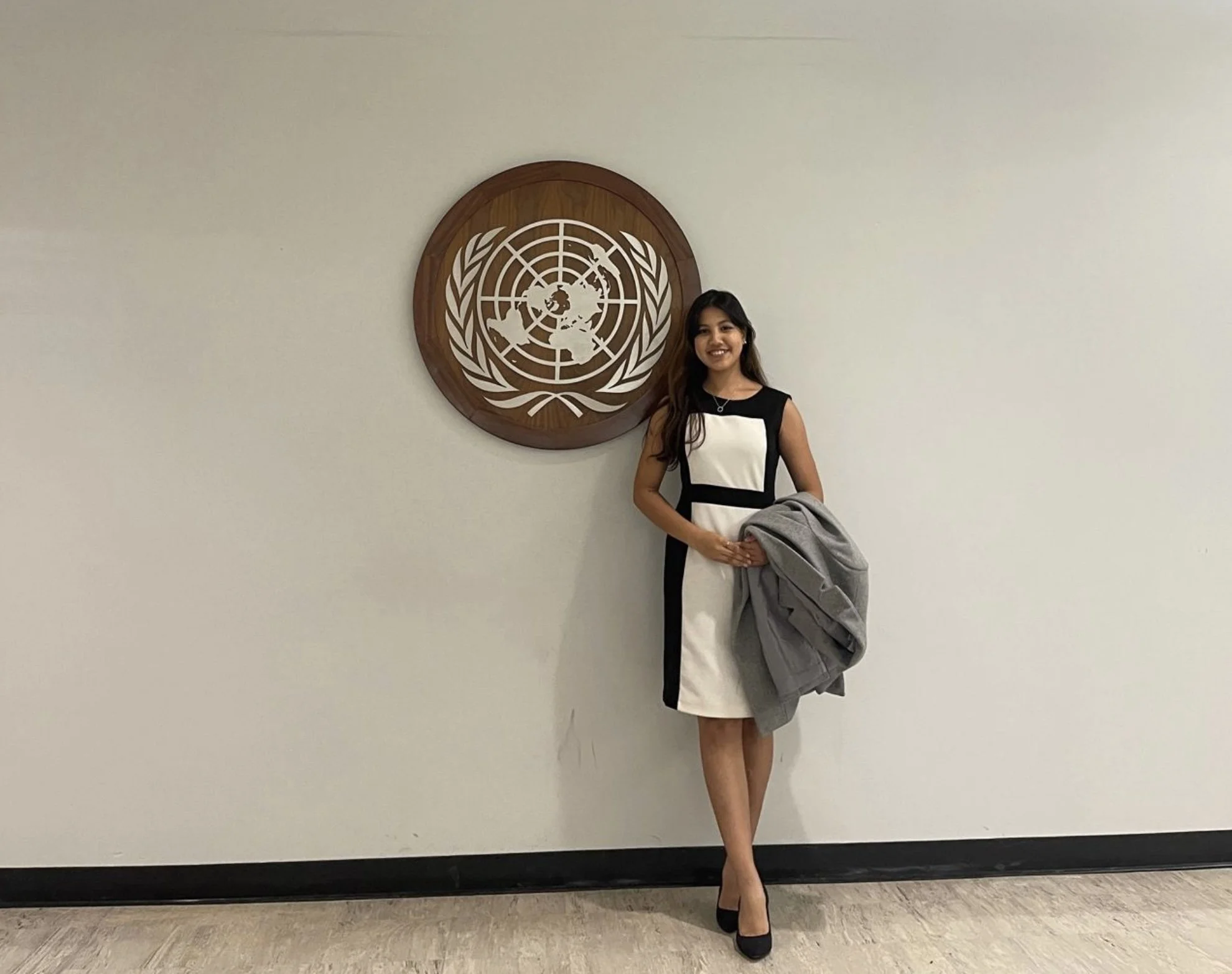2nd Meeting of States Parties to the Treaty on the Prohibition of Nuclear Weapons
The Second Meeting of States Parties to the Treaty on the Prohibition of Nuclear Weapons (2MSP) was held from November 27 to December 1, 2023, at the United Nations Headquarters in New York.
The Nuclear Age Peace Foundation and its youth initiative, Reverse The Trend brought a large youth delegation, hosted an art exhibit, delivered statements, and organized side events throughout the week.
In collaboration with the Mission of Kiribati, our project coordinator and NAPF’s Policy and Advocacy Coordinator, Christian N. Ciobanu served as the co-chair of victim assistance, environmental remediation, international cooperation and assistance (Articles 6 and 7). He co-presented the report on Articles 6 and 7 with Kazakhstan.
As a result of close collaboration with the Mission, we helped to bring 5 young women from Kiritimati, Kiribati, the site of US and UK’s nuclear tests. At the 2MSP, they shared their personal experience with the nuclear legacy and their perspectives on nuclear justice.
Kiribati Youth and RTT’s NAPF Project Coordinator at 2MSP
NAPF’s RTT Youth Campaigners Delivered Statements
We are committed to empowering young people and providing opportunities to express themselves at major UN conferences. It is our belief that diplomats should listen to the voices of young people because the current policies by the Nuclear Weapon States directly impact them.
During the 2MSP, Stella Dean Rose, NAPF intern and youth campaigner for RTT, and Brock Walker, a member of our delegation, delivered statements. Stella provided general exchanges and Brock focused his statement on Articles 6 and 7 on victim assistance.
Stella Dean Rose - General Exchange of Views
Brock Walker - Articles 6 and 7 on Victim Assistance, Environmental Remediation, International Cooperation and Assistance
On the First Day of the 2MSP, we convened the international youth orientation at the Mission of Ireland. H.E. Ambassador Fergal Mythen of Ireland delivered the keynote address. Additional speakers included: Veronique Christory of the ICRC; Soo Hyun-Kim of the UN Office for Disarmament Affairs; Benetick Kabua Maddison, the Executive Director of the Marshallese Educational Initiative; and Keita Takagaki, a youth representative of ICRC Japan. We were proud to host this training and orientation with Ireland for a second time. We would like to thank the Marshallese Educational Initiative and The Prospect Hill Foundation for co-sponsoring it. All photos were taken by Joseph Lovekin/Shutterstock 2023.
International Youth Orientation
(Left to Right) H.E. Ambassador Fergal Mythen of Ireland, Christian N. Ciobanu of NAPF/RTT, Benetick Kabua Maddison of MEI, Keita Takagaki of ICRC Japan, Veronique Christory of the ICRC, Seth Shelden of ICAN, and Soo Hyun Kim of UNODA
NAPF and RTT Participants at the Mission of Ireland

H..E. Ambassador Fergal Mythen of Ireland
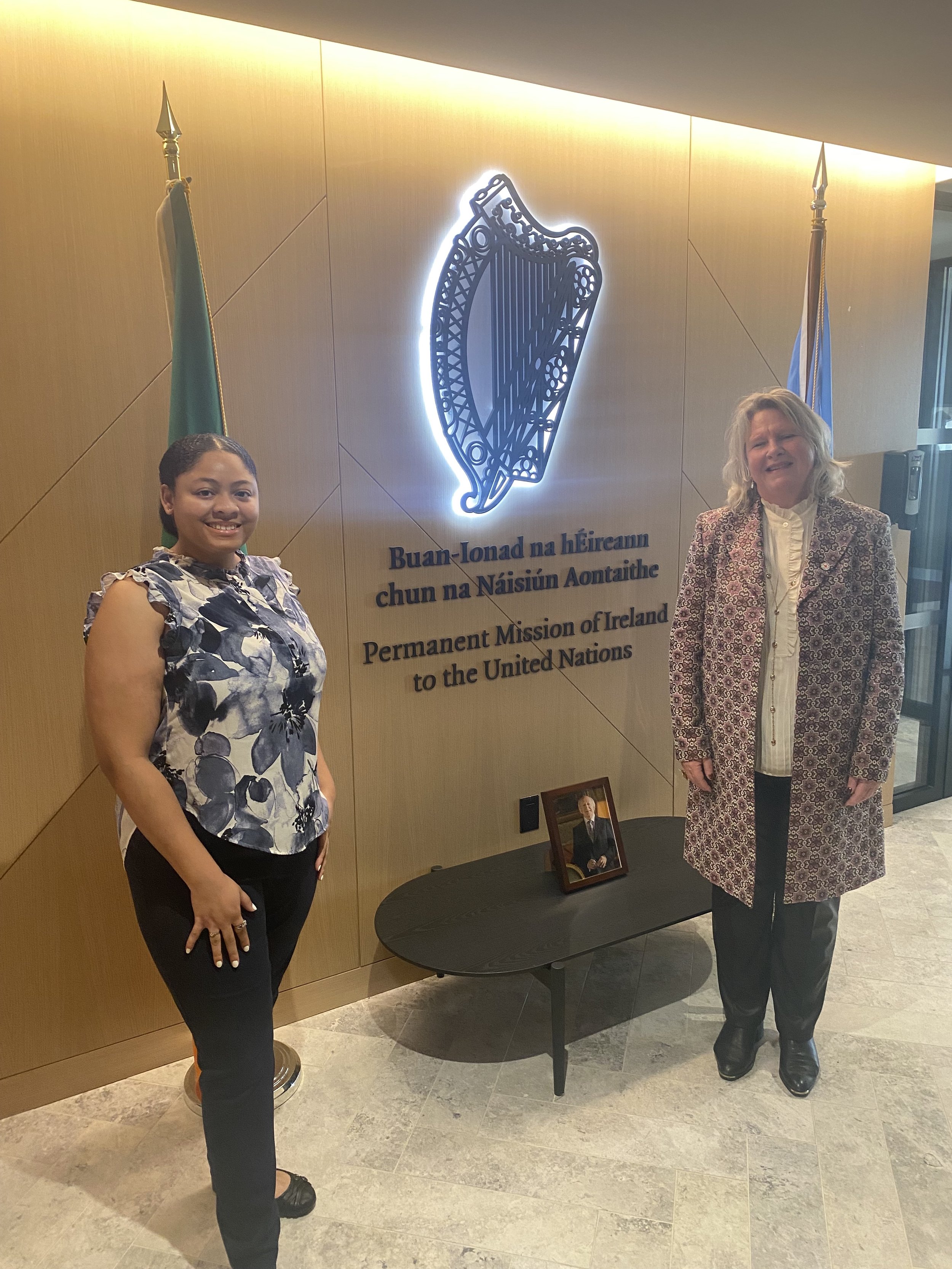
Ryan Rowe, RTT Social Media Coordinator and Veronique Christory, Senior Arms Adviser, ICRC

Benetick Kabua Maddison, Executive Director of MEI and RTT

Benetick Kabua Maddison, MEI and Keita Takagaki, ICRC Japan
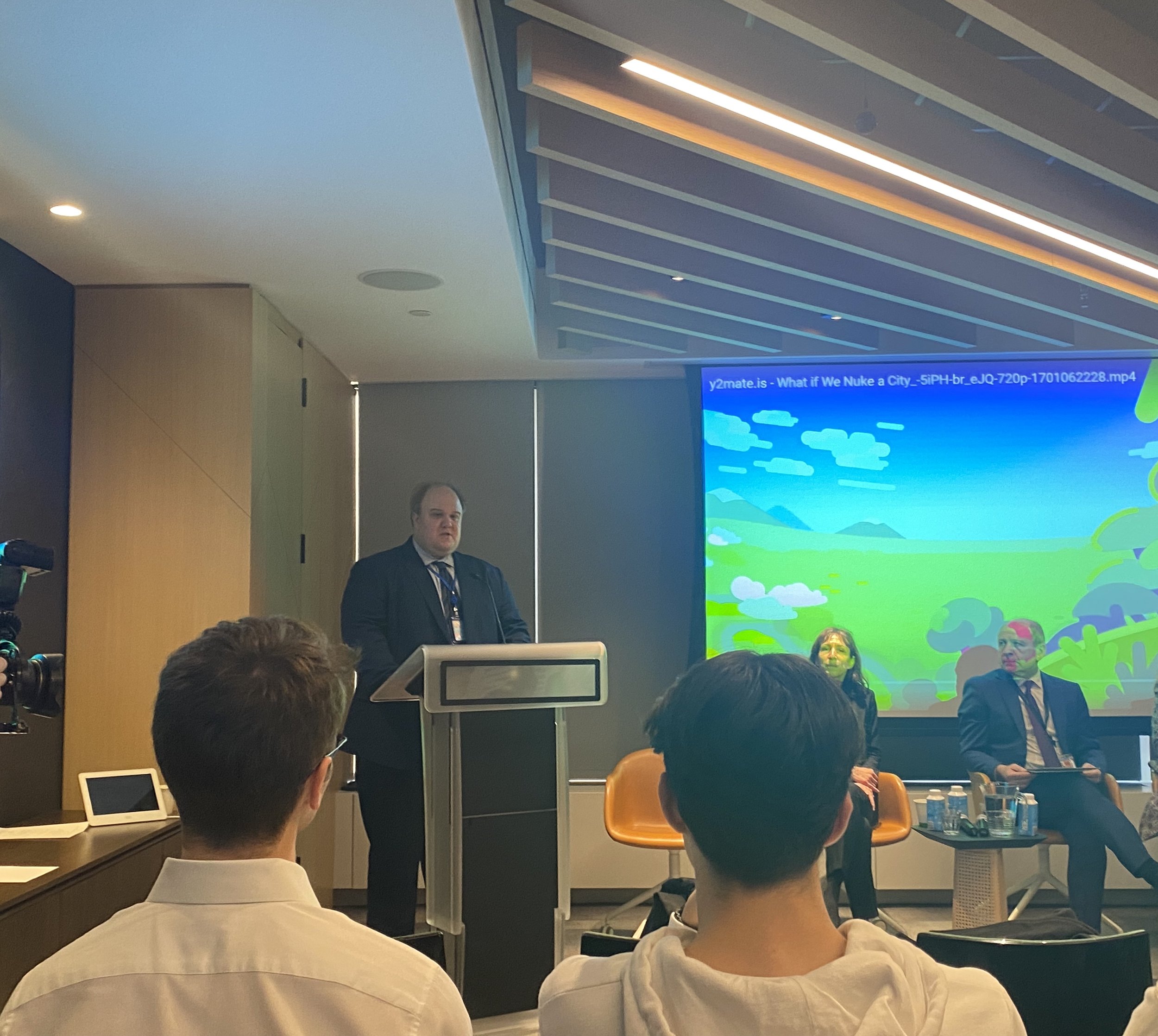
Christian Ciobanu, Policy and Advocacy Coordinator, NAPF and Project Coordinator, RTT

Youth listening intently to the presentations

Veronqiue Christory, Senior Arms Adviser, ICRC

Keita Takagaki, ICRC Japan
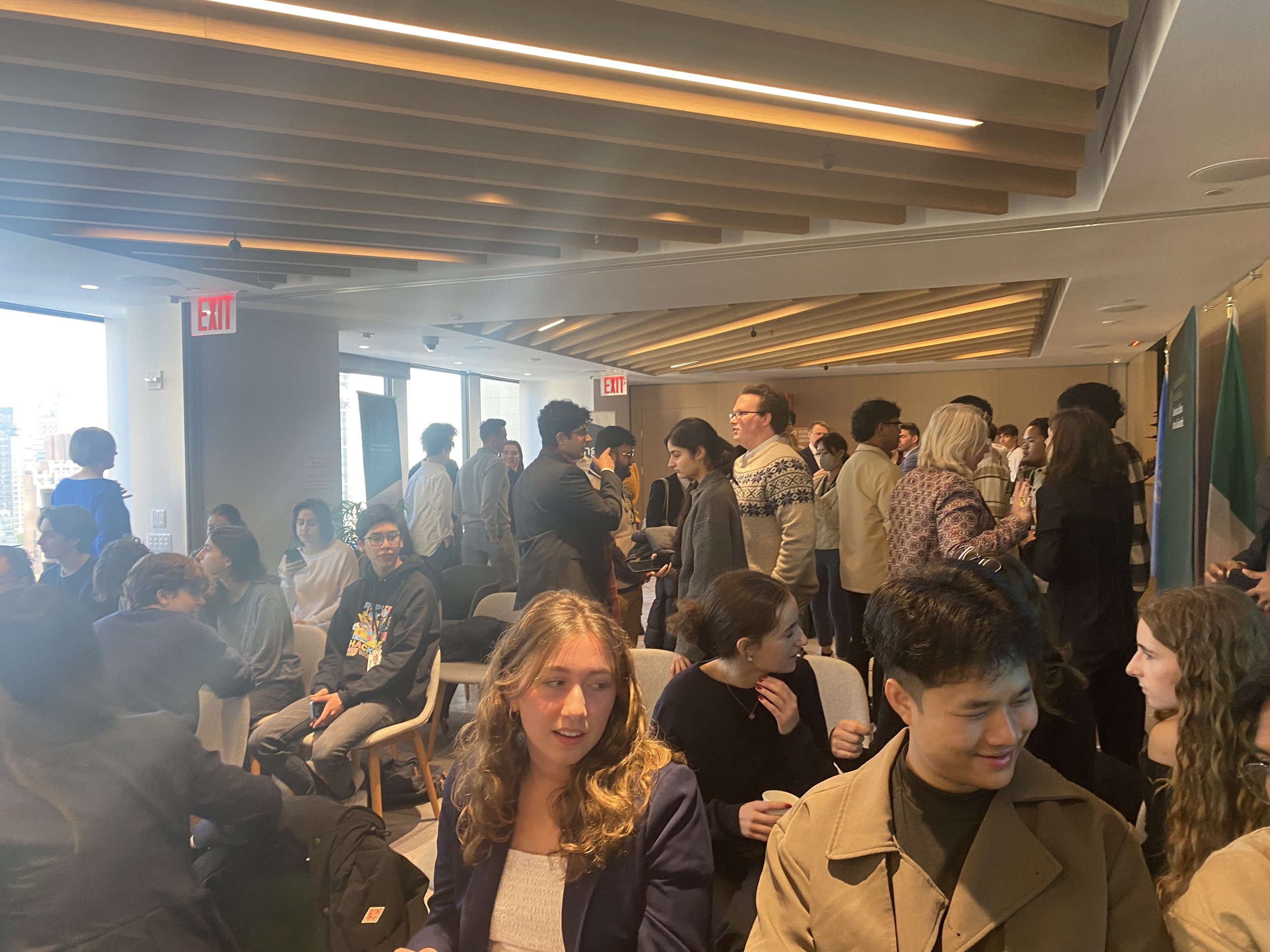
Youth Engaging with one another

Soo Hyun Kim, Youth4Disarmament Lead, UNODA

Seth Shelden, UN Liasion, ICAN

Youth Participant poses in front of camera
Official Side Events to the 2MSP
We hosted three official events to the 2MSP, including the Positive Obligations of the Treaty on the Prohibitions of Nucler Weapons, ASEAN Regional Perspectives on the TPNW, and From Hiroshima to the Pacific.
Positive Obligations of the Treaty on the Prohibition of Nuclear Weapons
On Monday, 27 November, Kiribati, Kazakhstan, Prefecture of Hiroshima, Nuclear Age Peace Foundation, Reverse The Trend: Save Our People, Save Our Planet, Marshallese Educational Initiative, and Rotary Action Group for Peace: Nuclear Weapons Education Committee hosted an important side event on the humanitarian provisions contained in Articles 6 and 7.
Kiribati and Kazakhstan serve as the Co-Chairs of the Working Group on Victim Assistance, Environmental Remediation, International Cooperation and Assistance.
High-level representatives from both states, plus Governor Hidehiko Yuzaki of Hiroshima; Bonnie Docherty, Director of the Armed Conflict and Civilian Protection Initiative, Lecturer on Law at Harvard Law School’s International Human Rights Clinic; Benetick Kabua Maddison, Executive Director, Marshallese Educational Initiative; Dr. Ivana Nikolic Hughes, Member of the Scientific Advisory Group to the TPNW and President of the Nuclear Age Peace Foundation; and Veronique Christory, Senior Arms Adviser, ICRC Delegation to the UN.
(Left to Right) Director of the Department of International Security of the MFA of Kazakhstan Mr. Arman Baissuanov; Veronique Christory, Senior Arms Adviser, ICRC; Bonnie Docherty, Director, Arms Conflict and Civilian Protection Initiative at Harvard Law School; Christian N. Ciobanu, Policy and Advocacy Coordinator, NAPF and Project Coordinator, RTT; Dr. Ivana Nikolic Hughes of NAPF; Governor Hidehiko Yuzaki of Hiroshima; and Benetick Kabua Maddison, Executive Director, Marshallese Educational Initiative and RTT Adviser
Photo Credit: Stephen Lovekin/Shutterstock, 2023

H.E. Ambassador Teburoro Tito of Kiribati

Christian N. Ciobanu, NAPF/RTT

Mr. Arman Baissuanov, Kazakhstan

Dr. Ivana Nikolic Hughes, NAPF

Panelists
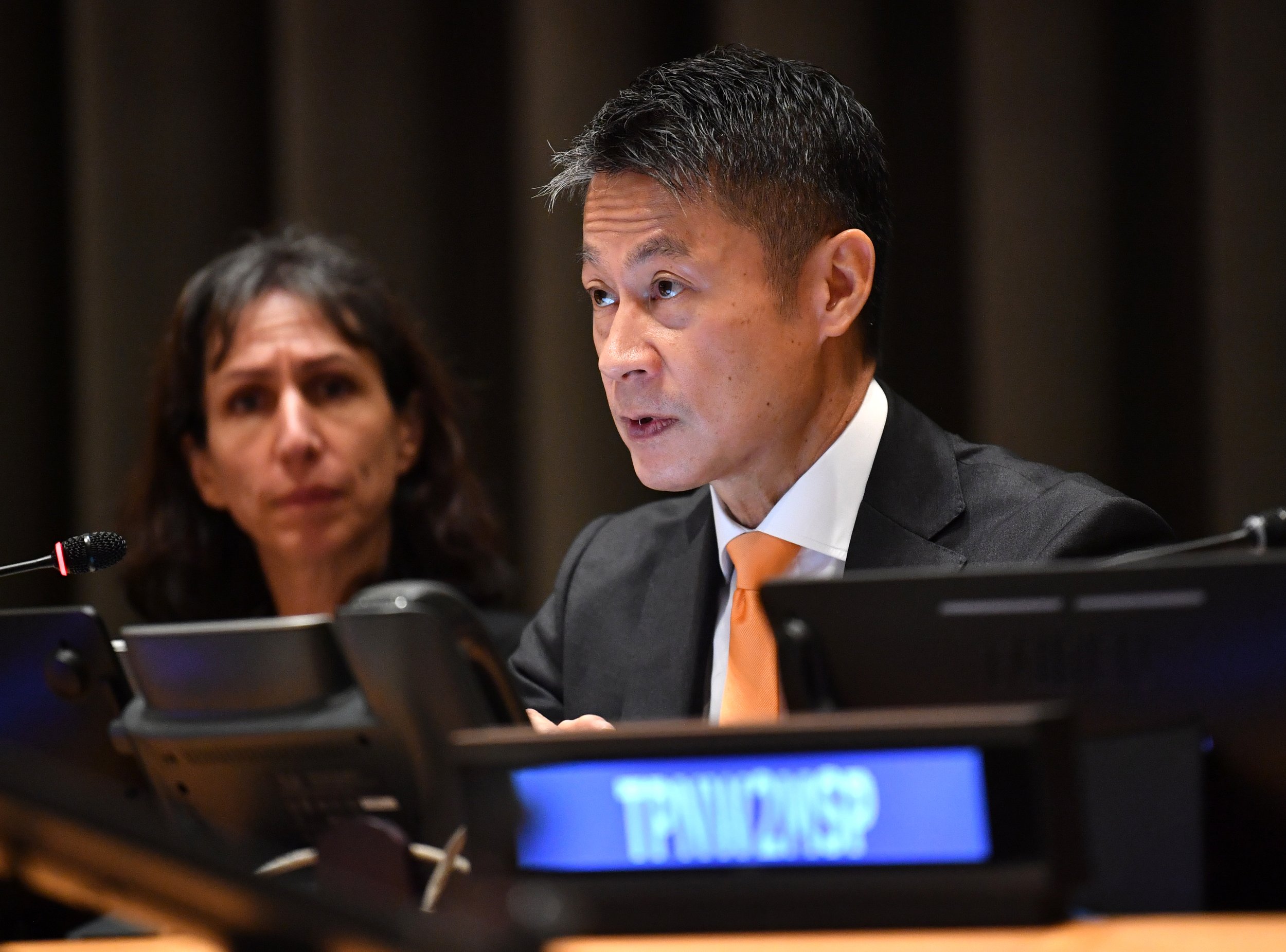
Governor Hidehiko Yuzaki of Hiroshima
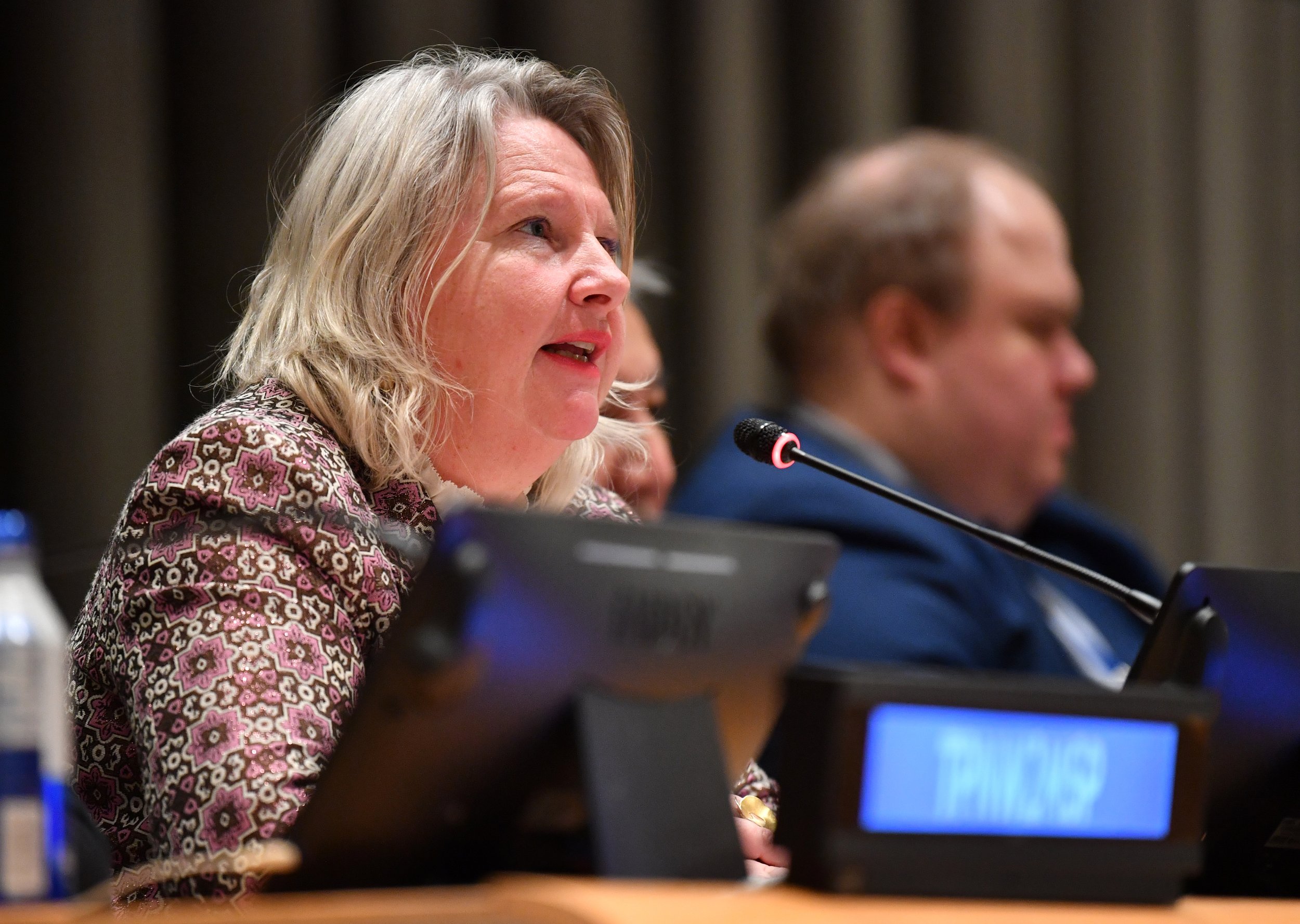
Veronique Christory, ICRC

Benetick Kabua Maddison, MEI

Bonnie Docherty, Harvard Law School
ASEAN Perspectives on the TPNW
On 15 December 1995, ASEAN Member States signed the Southeast Asian Nuclear Weapon-Free Zone Treaty (SEANWFZ Treaty) as a commitment to preserve the Southeast Asian region as a region free of nuclear and other weapons of mass destruction. The region’s history demonstrates that far more can be gained through cooperation than through conflict. As a result, it is imperative that the ASEAN region unite around the Treaty on the Prohibition of Nuclear Weapons (TPNW), which complements the Nuclear Non-Proliferation Treaty by closing the missing legal gap.
On Tuesday, 28 November, the Mission of Thailand, Nuclear Age Peace Foundation and its youth initiative, Reverse The Trend hosted a side event on ASEAN Perspectives on the TPNW. Speakers included: Vowpailin Chovichien, Counsellor, Peace, Security, and Disarmament Division, Department of International Organizations, Ministry of Foreign Affairs of Thailand; Shivanand Sivamohan, Second Secretary, Permanent Mission of Malaysia to the United Nations, Dr. Muhadi Sugiono, Lecturer at the Institute of International Studies of the Universitas Gadjah Mada; Muhammad Amir Ruzain Bin Abu Bakar, a Youth Coordinator for Reverse the Trend, ASEAN Chapter; Rungrot Tatiyawongwiwat Youth Coordinator for Reverse the Trend, ASEAN Chapter shared their perspectives on the TPNW. Ibraheem Waraich of NAPF/RTT moderated the event.
(Center Left to Right) Dr. Muhadi Sugiono of the Universitas Gadjah Mada, Vowpailin of Thailand, Ibraheem Waraich of NAPF/RTT, Amir Ruzain Bin Abu Bakar and Rungrot (Bond) Tatiyawongwiwat of RTT Southeast Asia

Dr.Muhadi Sugiono of the Universitas Gadjah Mada and Vowpailin Chovichien of Thailand listen to the other presenters
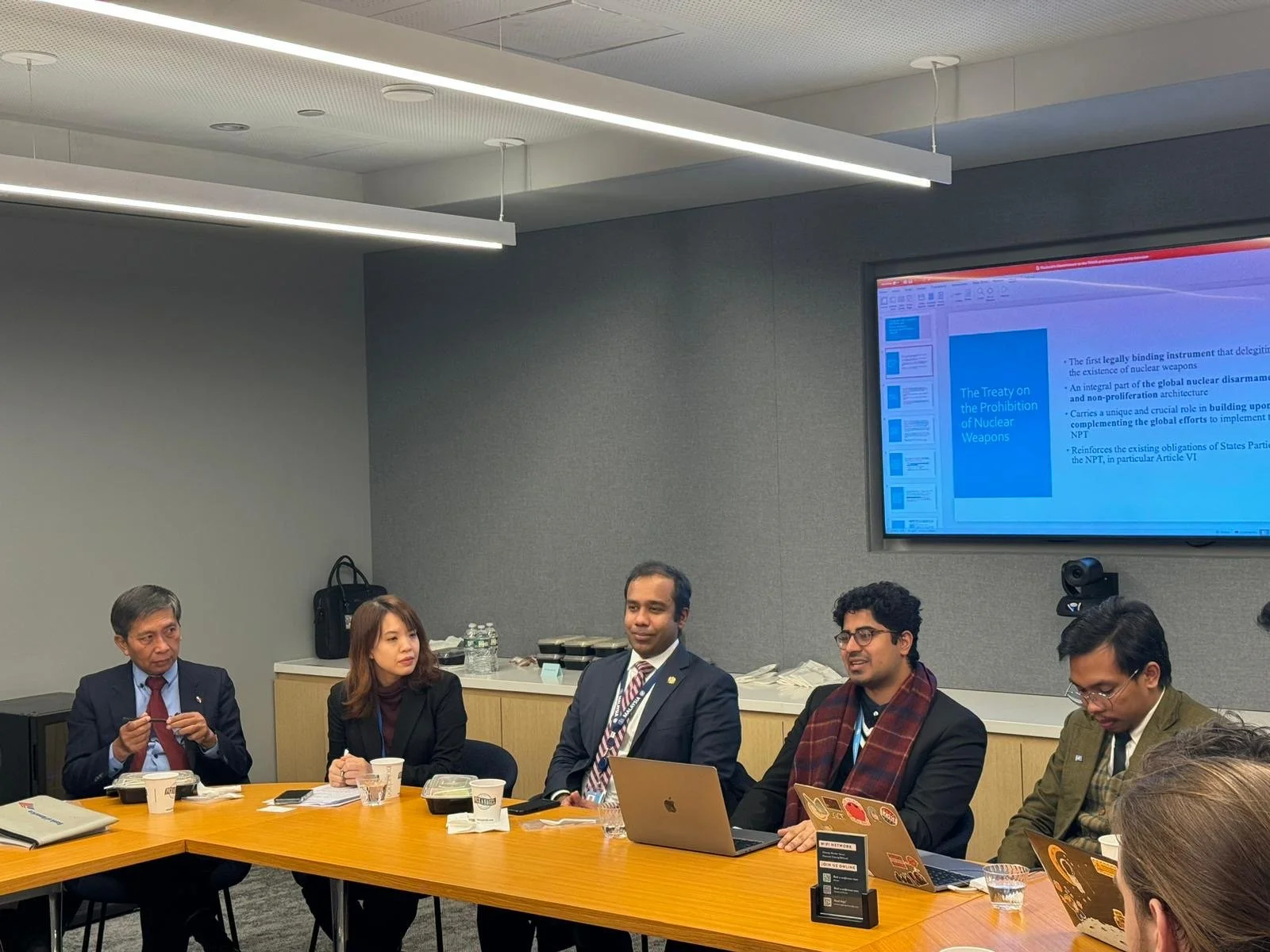
Ibraheem Waraich of RTT delivers his remarks
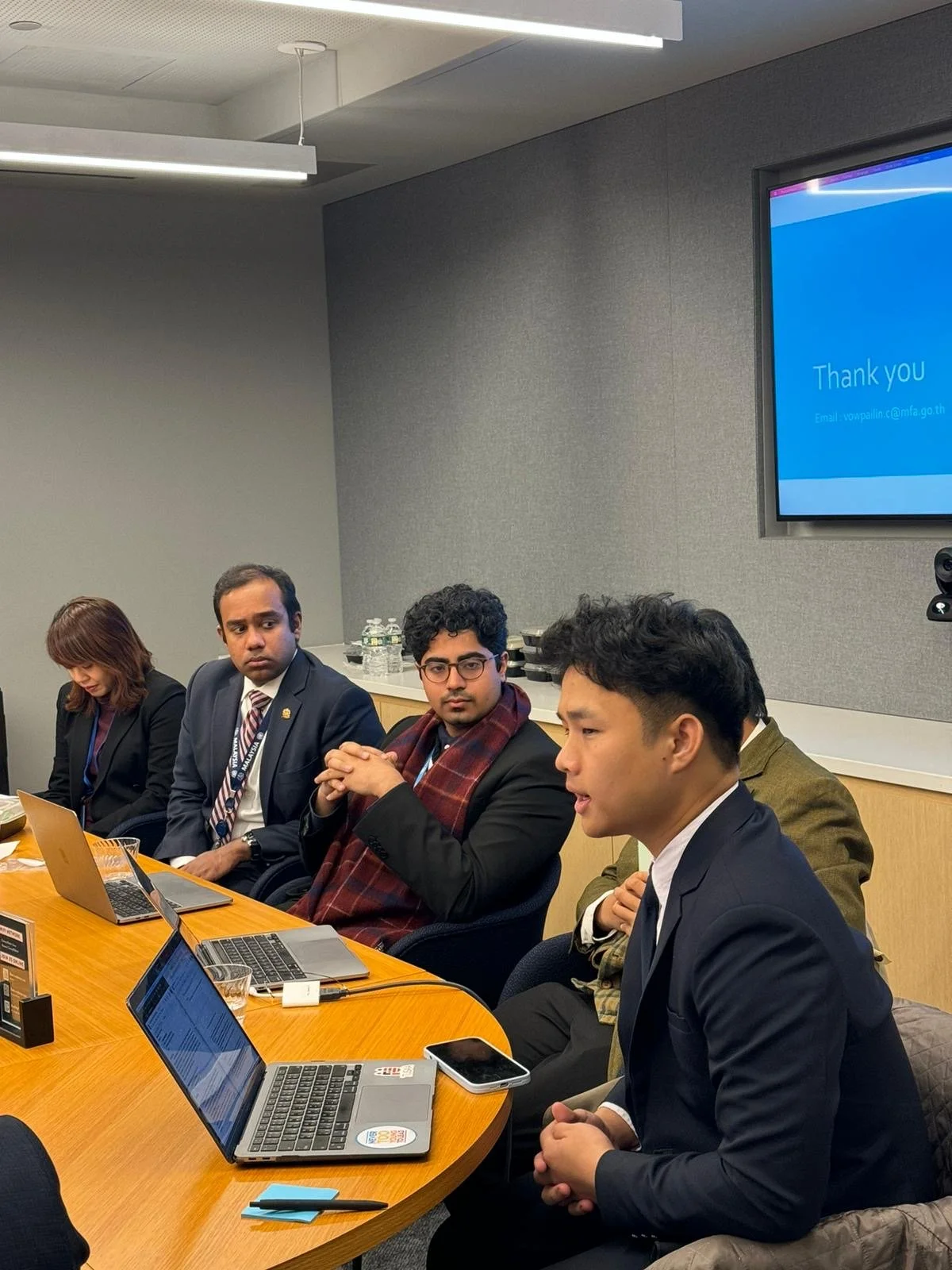
Rungrot (Bond) Tatiyawongwiwat of RTT SESA shares his perspectives
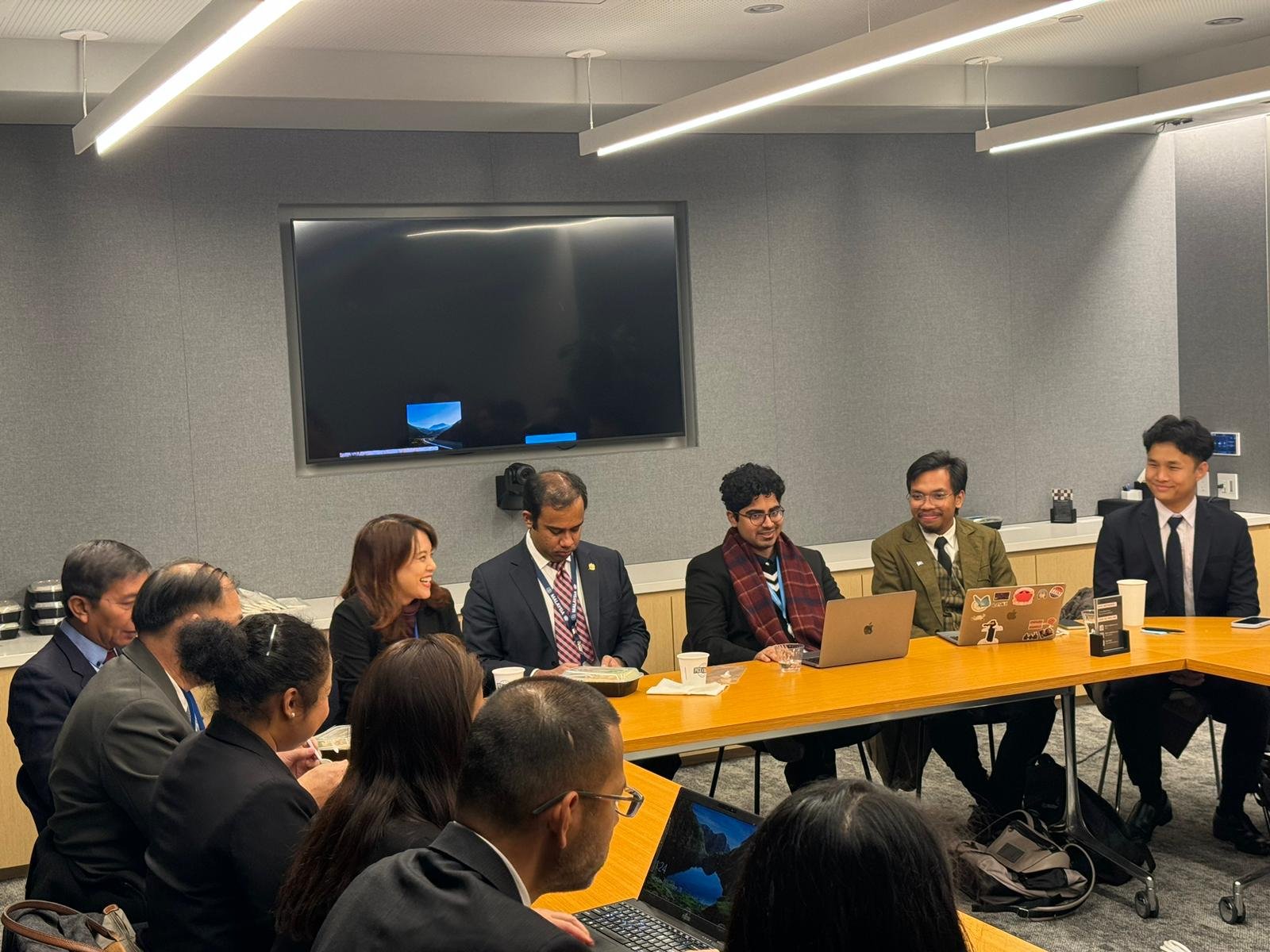
Ms Vowpailin Chovichien of Thailand shares her state's views
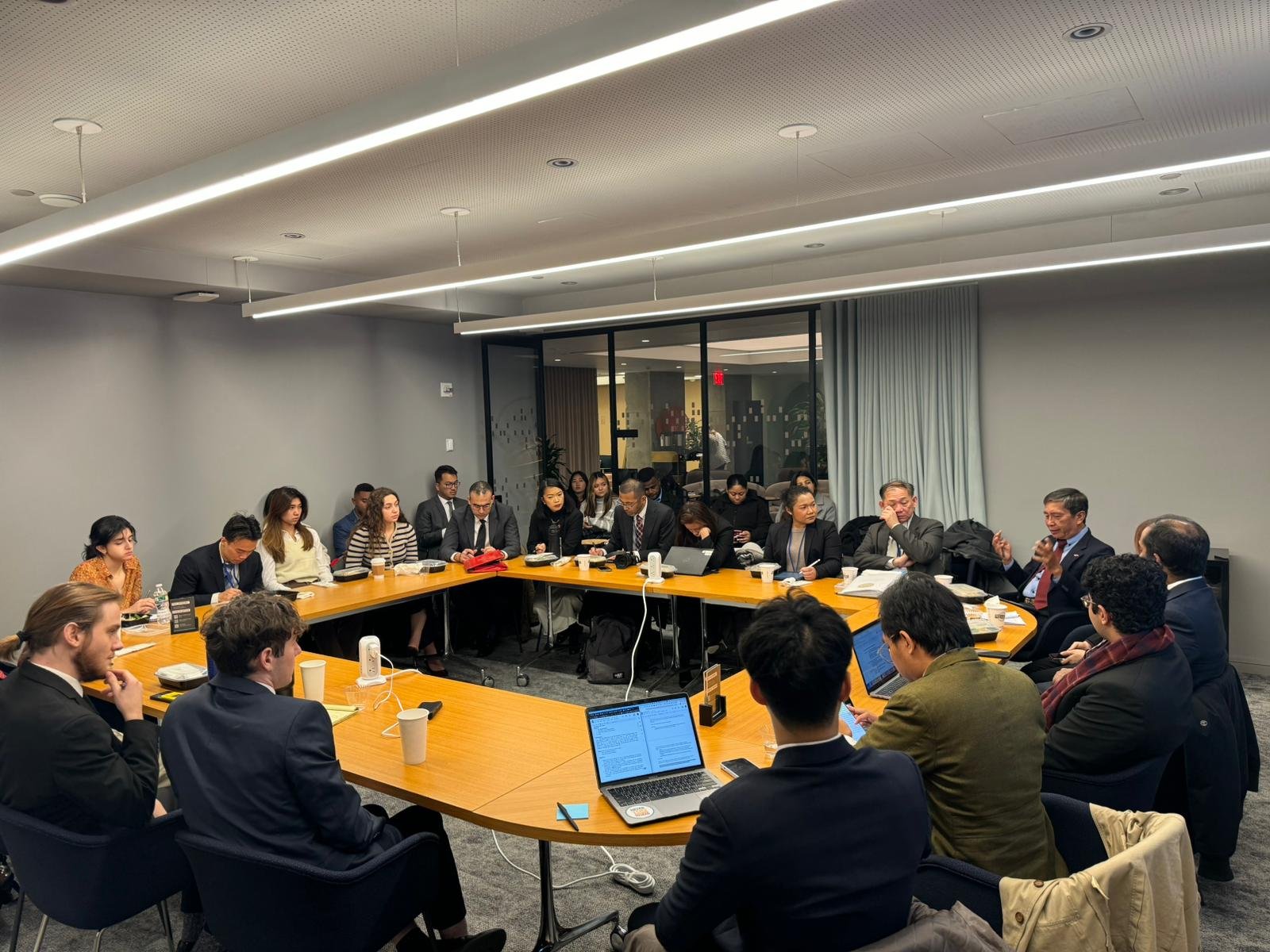
Dr. Muhadi Sugiano of the Universitas Gadjah Mada shares his perspectives

Participant presents his questions

Rungrot (Bond) Tatiyawongwiwat of RTT SESA shares his perspectives
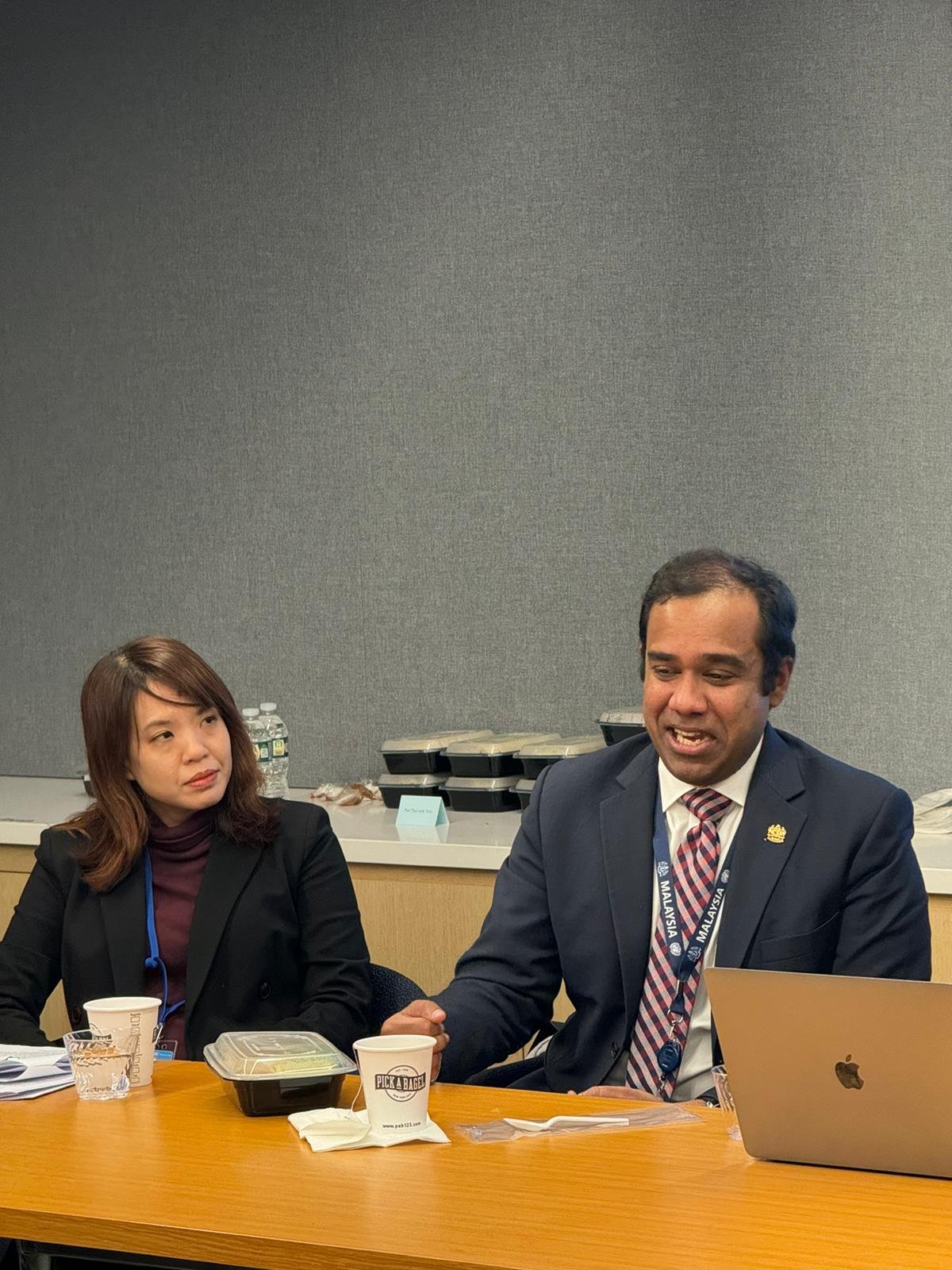
Ms Vowpailin Chovichien of Thailand and Mr. Shivanand Sivamohan of Malaysia
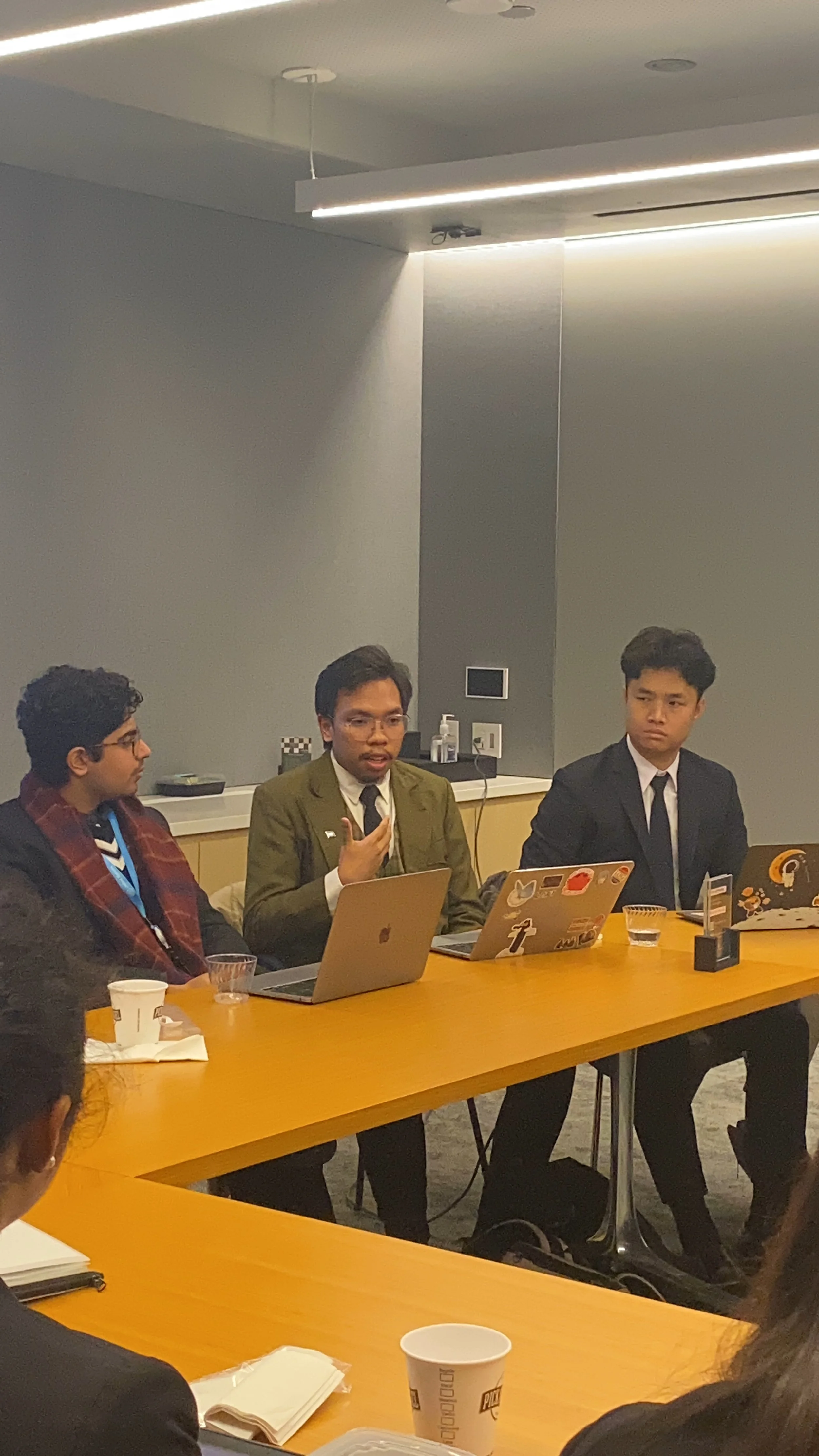
Muhammad Amir Ruzain bin Abu Bakar of RTT SESA shares his perspectives
From Hiroshima to the Pacific
(Center Left to Right):
Asuka Oka, RTT Activist; Keita Takagaki, ICRC Japan Youth; Maverick Peter Seda, Youth Coordinator for RTT Pacific, Benetick Kabua Maddison, Executive Director, Marshallese Educational Initiative and RTT Adviser; Christian N. Ciobanu, Policy and Advocacy Coordinator, NAPF and RTT Project Coordinator; Tinabora Ioane, Youth Delegate from Kiritimati; and Dr. Becky Alexis Martin, Lecturer of Peace and International Development, University of Bradford
On Thursday, 30 November, the Mission of Kiribati, Nuclear Age Peace Foundation, Reverse The Trend: Save Our People, Save Our Planet, Marshallese Educational Initiative, and The Prospect Hill Foundation convened a significant event entitled From Hiroshima to the Pacific.
Speakers included: Keita Takagaki, ICRC Japan Youth; Asuka Oka, RTT Activist; Dr. Becky Alexis Martin, Lecturer of Peace and International Development, University of Bradford; Tinabora Ionae, Youth Delegate from Kiritimati; Benetick Kabua Maddison, Executive Director, Marshallese Educational Initiative, and Maverick Peter Seda, Youth Coordinator, Reverse The Trend Pacific. H.E. Ambassador Teburoro Tito of Kiribati chaired the panel. Christian N. Ciobanu, Policy and Advocacy Coordinator of NAPF and RTT Project Coordinator; and Stella Dean Rose, NAPF intern and RTT youth campaigner co-moderated the event.
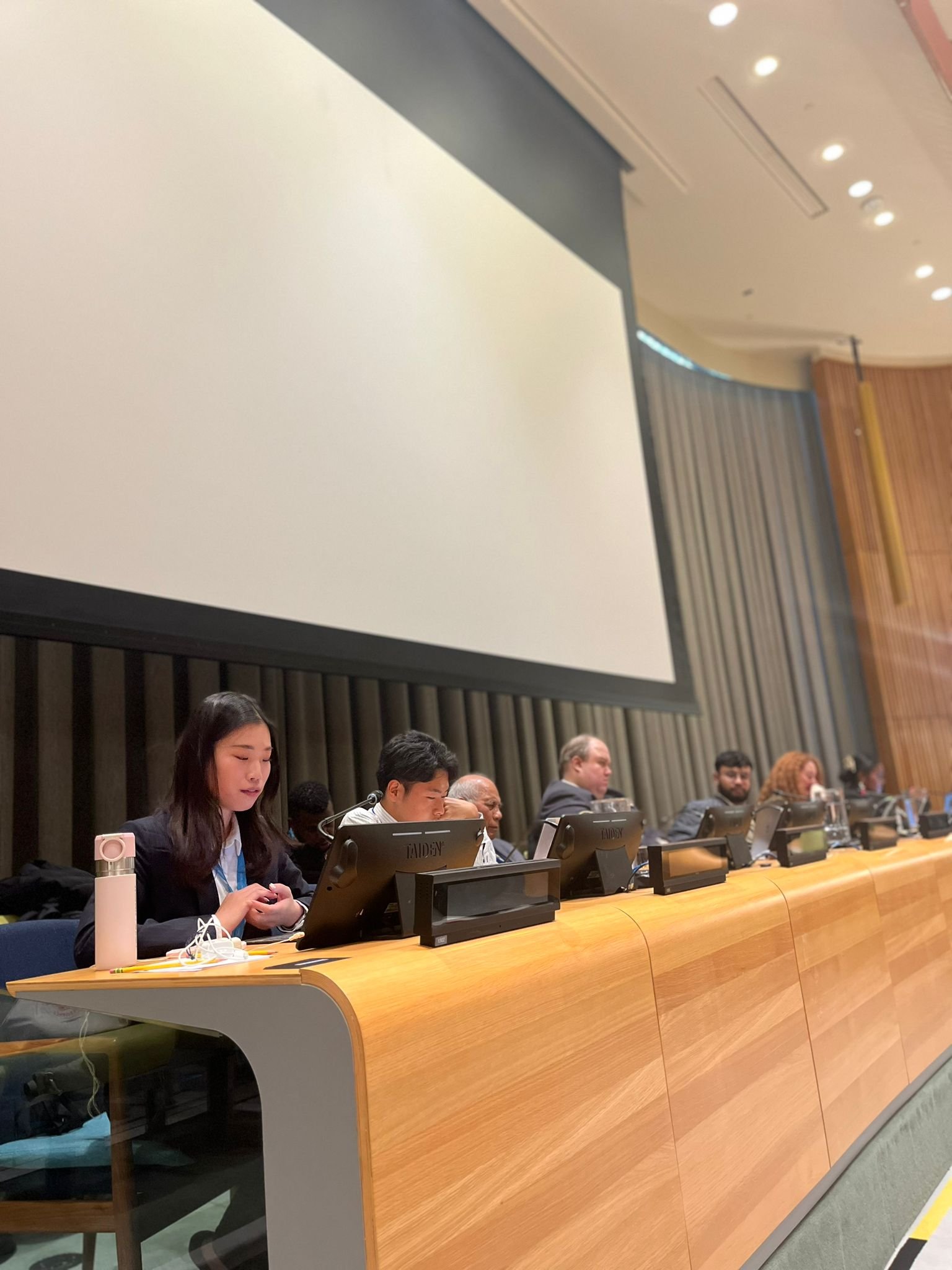
Asuka Oka presents her perspectives on Hiroshima

Panelists listen to Benetick Kabua Maddison's presentation

Keita Takagaki delivers his statement
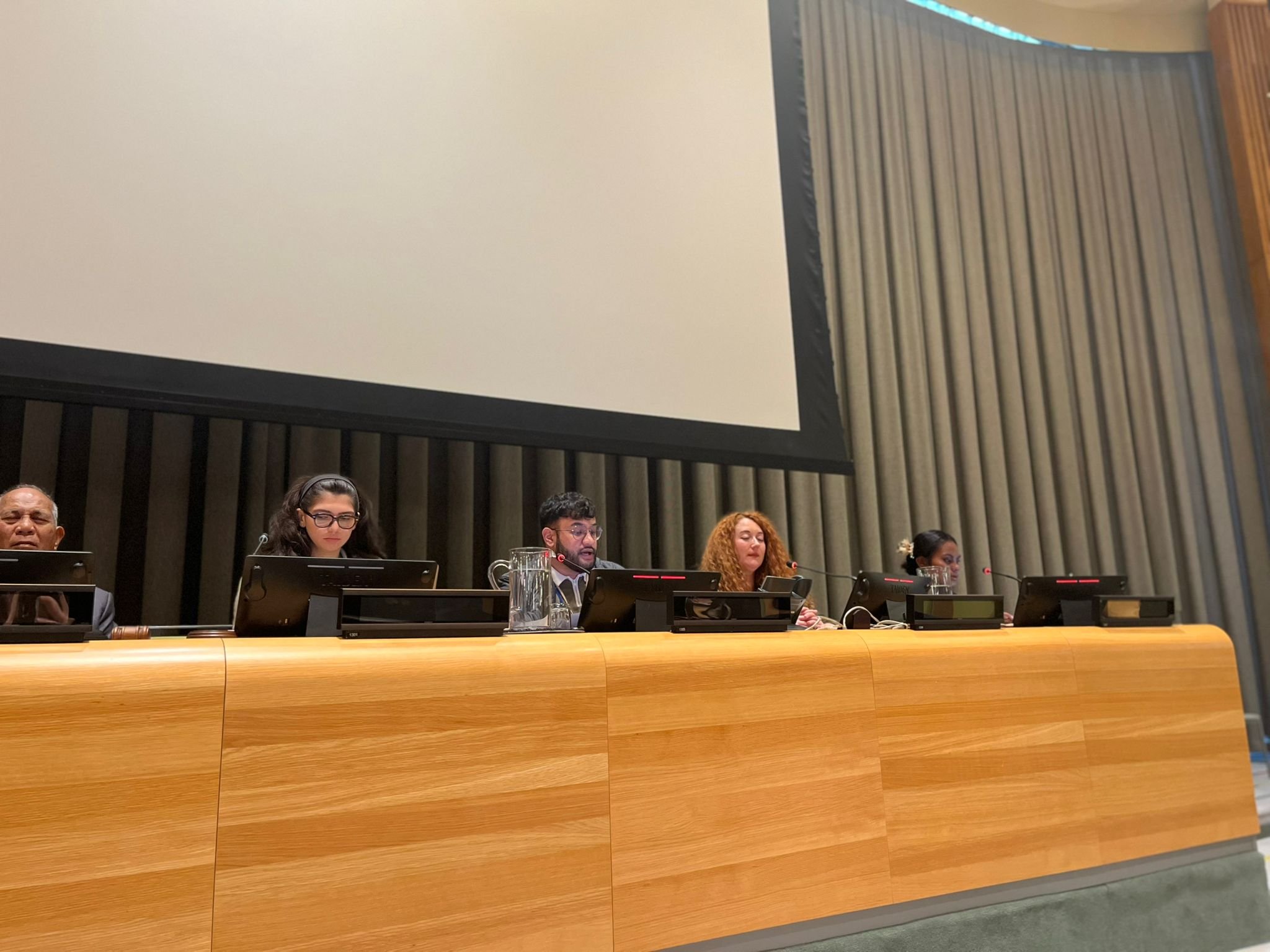
Benetick Kabua Maddison shares his perspectives about the Marshall Is
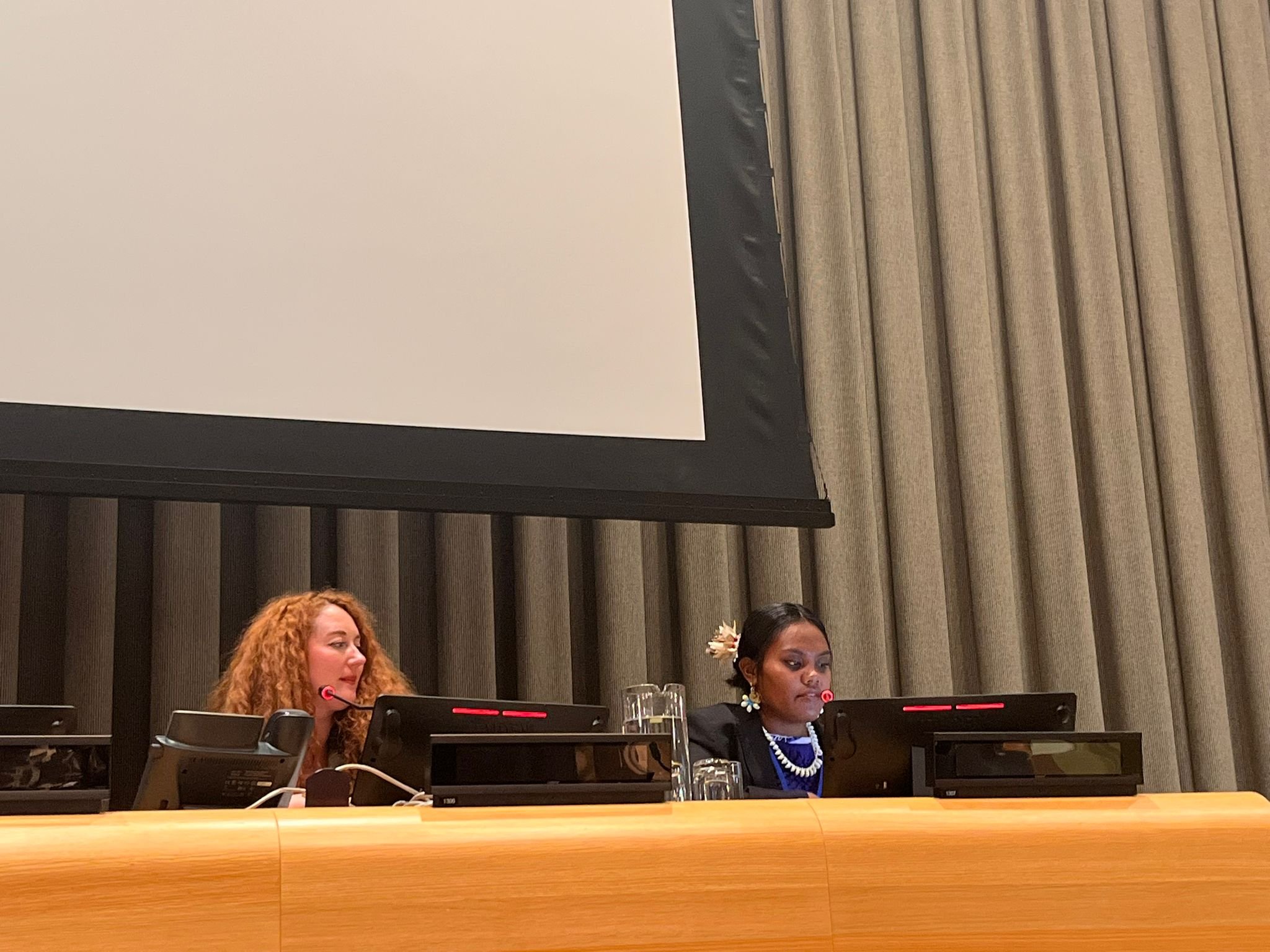
Tinabora Ioane delivers a personal statement about the impact of nuclear tests

Dr. Becky Alexis-Martin shares her experience with i-Kiribati citizens and poses for a picture with Benetick Kanabua Maddison
Hope for A Better Tomorrow Art Exhibit and Nuclear Free Future Awards
Nuclear Free Future Awards
Sponsors: Beyond Nuclear, IPPNW, Nuclear Age Peace Foundation, Reverse The Trend, Marshallese Educational Initiative, and The Prospect Hill Foundation
Inspired by the World Uranium Hearing in 1992, the Nuclear-Free Future Awards were first presented in 1998 in Salzburg, Austria and have traveled around the world for 25 years. The Nuclear-Free Future Awards honor individuals and initiatives worldwide that have made a significant contribution toward ridding the world of uranium mining, nuclear weapons, nuclear power and uranium munitions.
Hosted this year by Beyond Nuclear and International Physicians for the Prevention of Nuclear War, Germany (IPPNW-DE) in partnership with Nuclear Age Peace Foundation (NAPF) and Reverse the Trend (RTT), the ceremony presents these awards alongside a brief yet poignant art exhibition. All works of art are original creations by youth from countries such the Marshall Islands and Kiribati. Youth from the Solomon Islands and Canada created powerful art to highlight their solidarity. This exhibit draws attention to the intergenerational effects of nuclear testing on populations across the globe, the impacts and exacerbations of these issues caused by climate change, and art’s unique ability to empower youth voices and construct a deeper sense of international solidarity.
.This year's winners are:
Tina Cordova, a seventh generation native New Mexican, cancer survivor and the co-founder of the Tularosa Basin Downwinders Consortium who has campaigned for more than 18 years to bring attention to the negative health effects suffered by the unknowing, unwilling, uncompensated, innocent victims of the first nuclear blast on Earth that took place at the Trinity site in New Mexico.
Benetick Kabua Maddison, a young US-based Marshallese activist who works to educate both US and international audiences about the terrible legacy of the 67 US atomic tests conducted in the Marshall Islands between 1946 and 1958 and the ongoing health, environmental, and cultural consequences.
Hinamoeura Morgant-Cross, a French Polynesian in her mid thirties, whose realization that her own leukemia was a legacy of the French atomic tests in the South Pacific led her into activism and to pressure the French government into both acknowledgement of responsibility and medical and financial support.
An honorary Lifetime Achievement Award will be presented posthumously to Daniel Ellsberg.
All photos are credited to Stephen Lovekin/Shutterstock, 2023.

Art Pieces by Pacific Youth

Art Pieces by i-Kiribati Youth

Guests engage with one another

Message by Youth

Performances by i-Kiribati youth
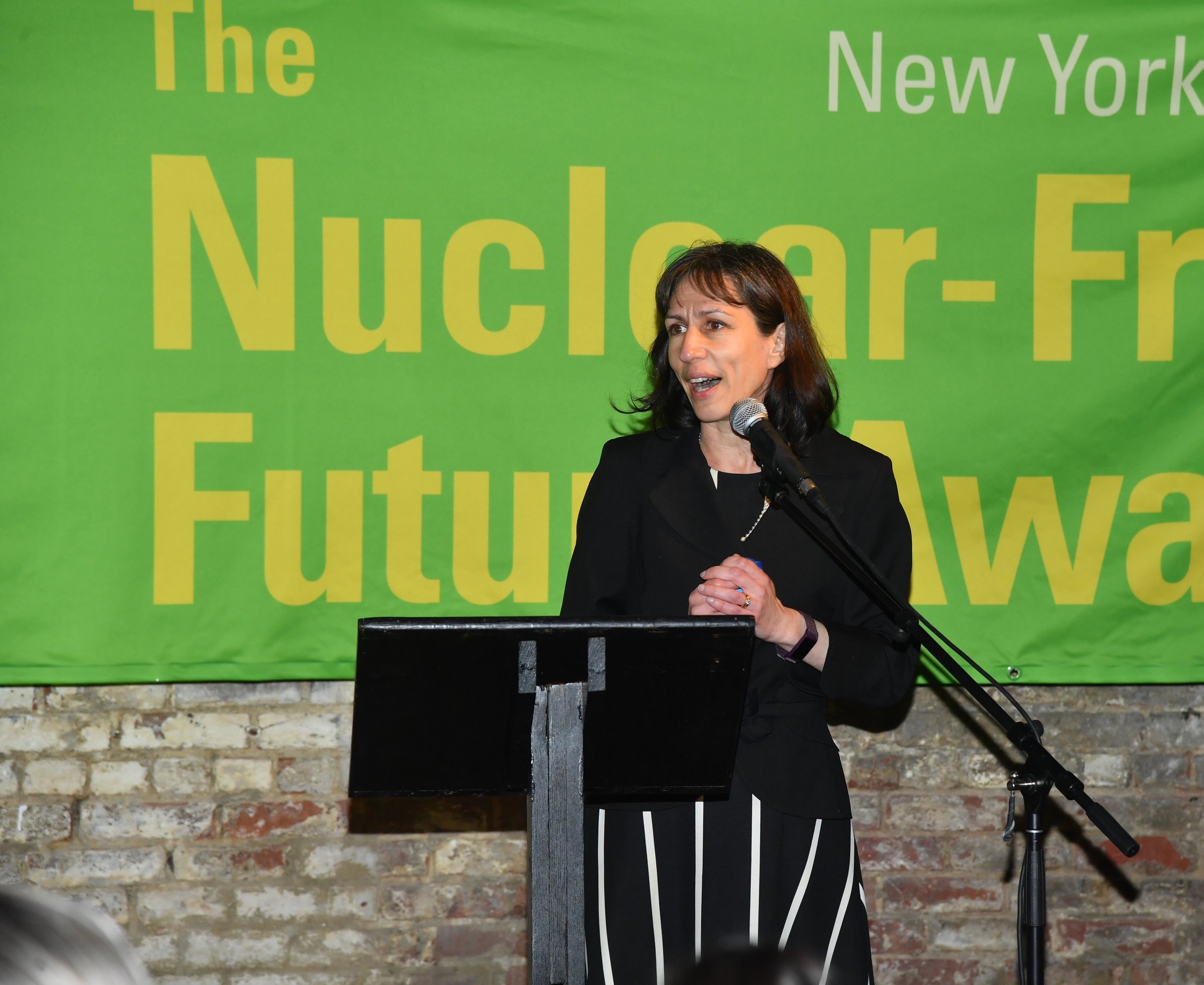
Dr. Ivana Hughes of NAPF addresses the participants

Mark Harmony performs
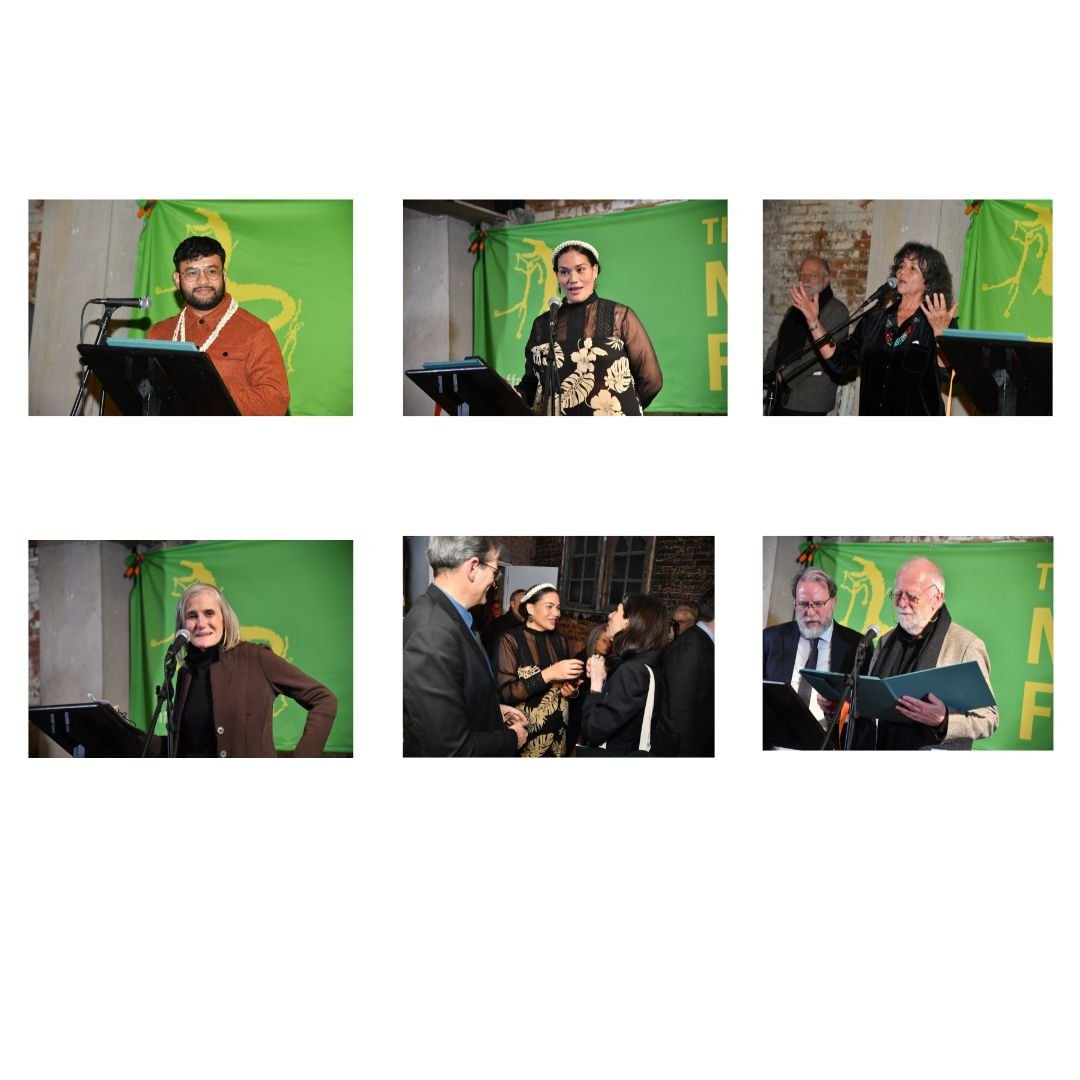
(Left to Right) Benetick Kabua Maddison of MEI, Hinamoeura Cross of Polynesia, Tina Cardova of Navajo First Nation, Amy Goodman of Democracy Now addresses the participants, Hnamoeura Cross engages in a conversation with Dr. Ivana Hughes, and Presentation of Award to Daniel Ellsberg posthumously
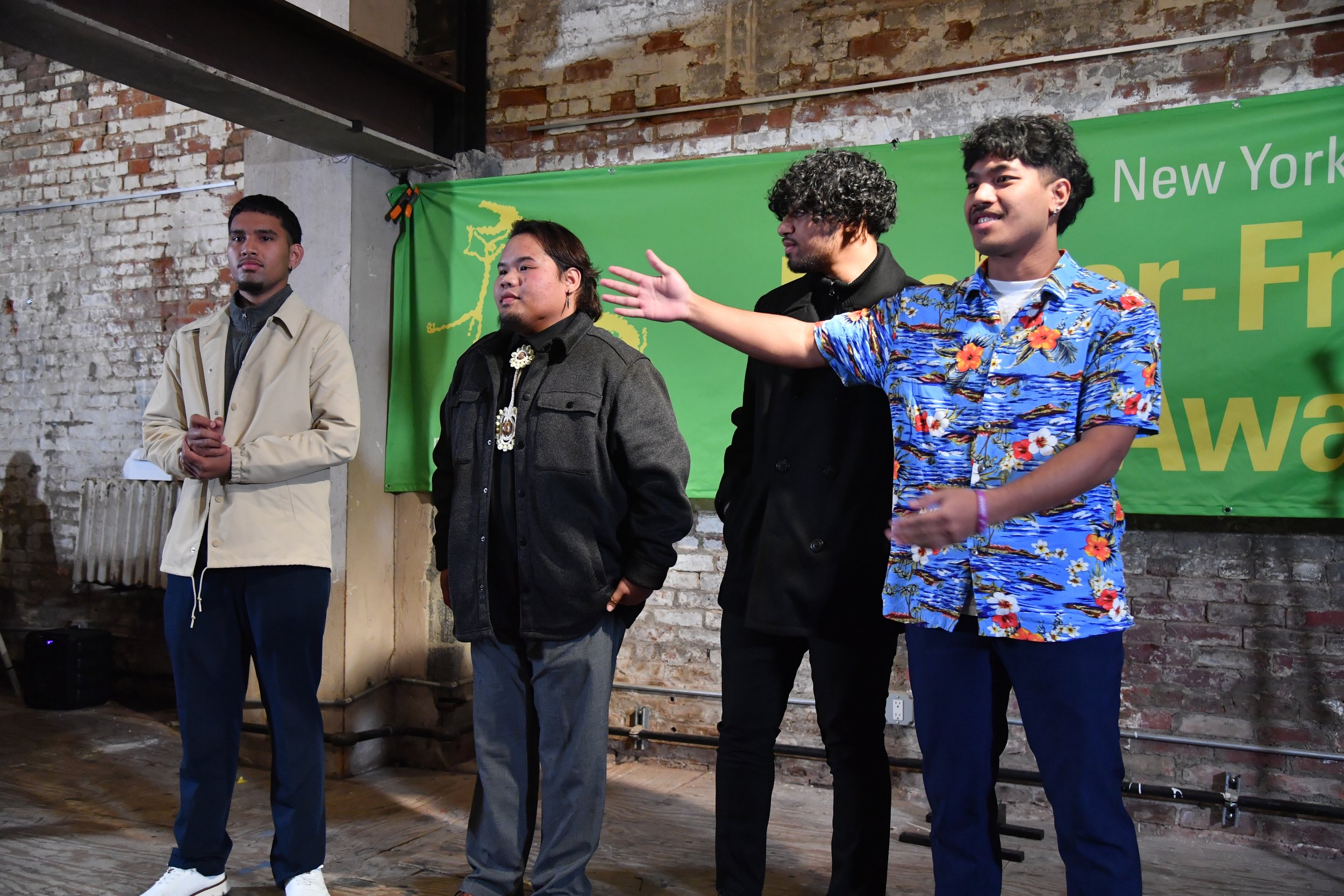
Mark Harmony delivers a performance

Powerful Message by Youth
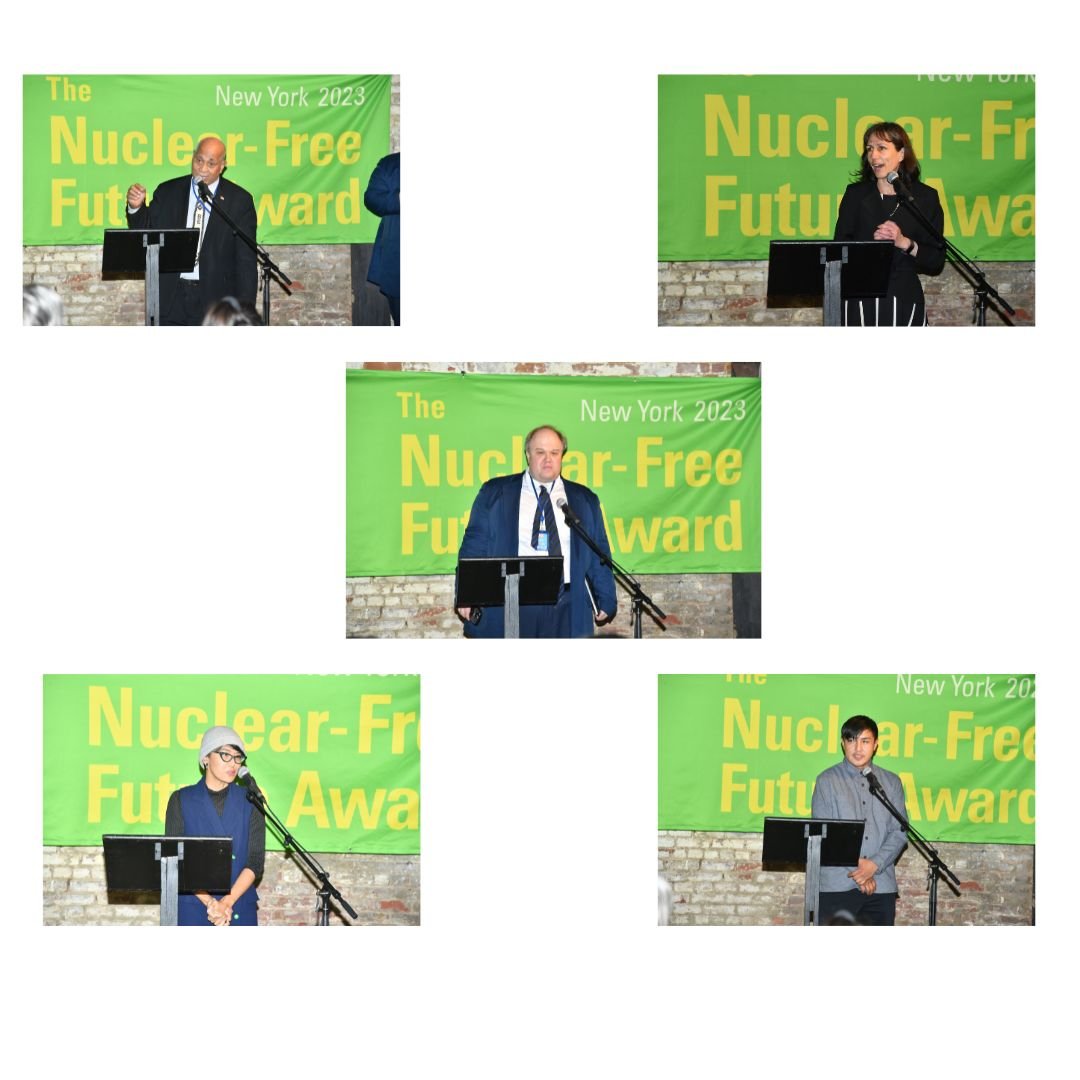
(Left to Right) H.E. Teburoro Tito of Kiribati, Dr. Ivana Hughes of NAPF, Lovely Umayam of Bombshelltoe and RTT, Loren Nelson of Navajo First Nation, and Christian N. Ciobanu of NAPF/RTT (Center)

Alexandra Andratis and Lovely Umayam discuss the Ecology of Peace, RTT Canada's Art Project with Miss Andratis
Hope for a Better Tomorrow Art Exhibit
This art exhibition intends to shed light on the profound impact of global nuclear testing on the youth in Kazakhstan and the Pacific region. The exhibition aims to foster recognition of the long-standing implications of nuclear testing in the 20th century on intergenerational populations worldwide.
Moreover, it underscores the capacity of art to amplify the voices of young people and nurture a more profound sense of international solidarity. The display featured artworks from international youth, expressing their solidarity with frontline communities and their grave concerns regarding the ecological consequences of nuclear weapons.
The exhibit was co-sponsored by Kiribati, Kazakhstan, NAPF, RTT, MEI, and the Prospect Hill Foundation.
Frankie and Molly, the core members of NAPF-RTT’s campaign team pose in front of our exhibit. Our exhibit consists of paintings by Pacific youth.
Additional Youth Events
We also co-hosted several youth activities and discussions, including Tik Tok for Nuclear Disarmament, Shades of Disarmament, and Youth Dialogues.
Nuclear disarmament is a critical global issue that demands broad public engagement and awareness. In this age of digital communication, social media platforms play a pivotal role in disseminating information and influencing public opinion. TikTok, with its vast and diverse user base, presents a unique opportunity to advance the cause of nuclear disarmament among young changemakers. This gathering aims to bring together advocates and influencers to build a stronger TikTok community focused on nuclear disarmament.
Shades of Disarmament is an original short documentary produced by Reverse the Trend and its supporters highlighting activists of color who were present at the 1982 Rally on Nuclear Disarmament. The film sheds light on the intersectional relationship between the struggles for environmental justice, social justice, and human rights. “Shades of Disarmament” focuses on the necessity of including diverse voices - many of whom were marginalized during the march and rally - in the disarmament movement.
Panelists and Organizers of Tik Tok for Disarmament
Molly Hurley delivers introductory remarks
Shades of Disarmament
Jim Anderson addresses the participants
Shades of Disarmament is an original short documentary produced by Reverse the Trend and its supporters highlighting activists of color who were present at the 1982 Rally on Nuclear Disarmament. The film highlights the intersectional relationship between the struggles for environmental justice, social justice, and human rights. “Shades of Disarmament” focuses on the necessity of including diverse voices - many of whom were marginalized during the march and rally - in the disarmament movement.
This film screening served as both the public launch of a uniquely grassroots film about a uniquely grassroots mass movement from the 1980s and an important point of access for engaging with nuclear weapons issues today. The timing of this launch was particularly synergistic for its coordination with the United Nation’s 2nd Meeting of States Parties to the Treaty on the Prohibition of Nuclear Weapons (aka the TPNW or the “Ban Treaty”).
Following the screening of the film, a panel discussion was held. Panelists included: Dr. Vincent Intondi, author of Saving the World from Nuclear War; Jim Anderson, President of Peace Action New York State; and Jeremiah Williams, RTT Activist who conducted several of the interviews for the film. Molly Hurley, RTT’s Campaign Manager, moderated the discussion.
Dr. Vincent Intondi shares his perspectives about the 1982 March and Rally
Molly Hurley, Dr. Vincent Intondi, Jim Anderson and Jeremiah Williams pose for a photo
To forge bonds of friendship with representatives from frontline communities, we organized two significant dialogues with youth from Kiribati and Kazakhstan respectively. Through these dialogues, we gained a deeper understanding of the humanitarian impact of nuclear weapons and built bonds of friendship.
International Youth Dialogues
RTT representatives meet with i-Kiribati delegates
RTT representatives meet with youth delegates from Kazakhstan
YOUTH TESTIMONIAL
‘’Nuclear abolition is the only way to eliminate nuclear risk’’
Reflecting on Nuclear Ban Week, I had the incredible opportunity to attend the Second Meeting of State Parties to the Treaty on the Prohibition of Nuclear Weapons (TPNW) at UN headquarters in New York. It’s a true honor to serve as a youth representative for this significant cause.
I extend my sincere gratitude to Reverse The Trend and Christian Ciobanu for making this experience possible and amplifying youth voices at the table.
—NISTHA SHRESTHA

